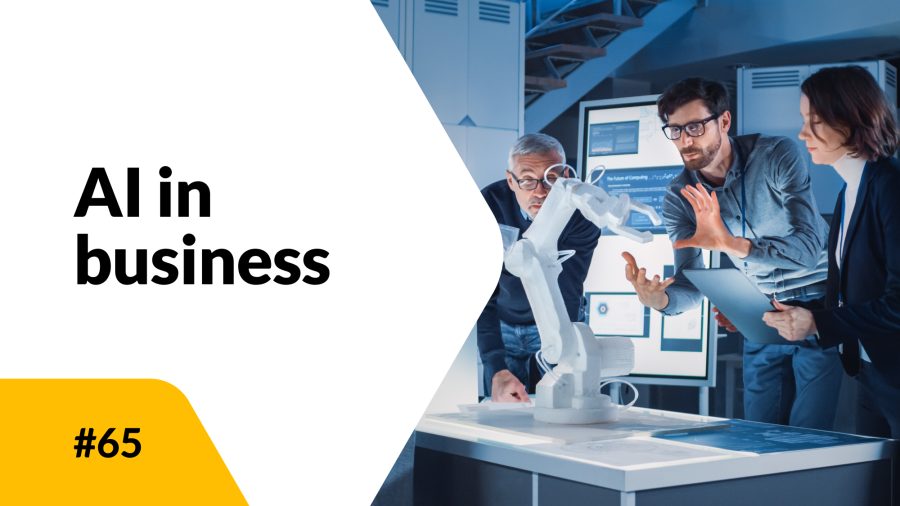Do you want to take advantage of the capabilities of artificial intelligence when implementing a new project in your company? AI can facilitate both the conceptual phase, streamlining the execution of individual tasks, as well as the analysis of the current and historical results of project activities. However, is it always worth it to opt for AI assistance during project implementation? How to assess the profitability of an AI project? How to deal with shortages of data and specialists? Where to start to avoid common pitfalls? Read on and find out what challenges lie in projects using AI.
AI project - table of contents
- How to effectively integrate AI project into your business strategy?
- AI project budgeting. Key challenges
- Data management issues in AI projects. What you should know
- Technical and security challenges in AI projects
- Key competencies in AI for entrepreneurs. What difficulties might you encounter?
- AI project success analysis. How to avoid mistakes when measuring ROI?
- Summary
How to effectively integrate AI project into your business strategy?
Gartner research says that by 2030, 80% of project management tasks will be handled by AI. What the percentage of projects using AI to complete tasks will look like – remains to be seen. However, it is already worth considering how to integrate AI into a company’s operations strategy.
The first step is to understand this technology’s potential and limitations. Artificial intelligence does well at analyzing trends and patterns but fails at things like multistep reasoning and moral decision-making. It creates sensational visuals, but getting it to consistently generate materials that match a brand’s image requires considerable skill. That’s why when we start working on an AI project, we can’t assume with a probability comparable to other projects whether it will produce concrete, measurable results.
A good starting point, therefore, is to analyze the pros and cons:
- What is the total cost of the various stages of AI project implementation?
- What KPIs should be defined to assess the business impact of an AI project?
To achieve a credible answer to these questions, it’s best to select simple AI projects that bring considerable value are easily measurable, and will fit into the company’s strategy. A startup offering courier services can serve as an example. Its goal is to improve customer service and increase supply chain flexibility. A simple but valuable AI project, for example, is the implementation of a chatbot that handles customer inquiries. Such a virtual assistant will handle more requests than a traditional call center, increasing customer satisfaction through quick responses to inquiries and consistent communication quality. In contrast, an advanced system that optimizes courier routes fits the goal of improving delivery flexibility but is complex and has much higher risks.
Once the initial AI projects have been determined, the startup should assess their feasibility, for example, in terms of the budget within which the AI project should fit.
AI project budgeting. Key challenges
Implementing an off-the-shelf SaaS or AI as a Service (AIaaS) solution, or so-called “off-the-shelf AI,” has many advantages. One is the predictable cost of using the tool and the relatively easy-to-estimated cost of implementing an AI project. You can choose from solutions such as:
- chatbot for customer service – such as Intercom Fin, LiveChat from Chatbot.com, Drift or FreshChat,
- Social media analytics to increase the reach of marketing messages – with Cortex, Buffer or Lately, or
- business data analysis with Microsoft Power BI, Tableau, or for less complex tasks – Google Bard, which integrates with Google documents.
For larger-scale AI projects, their costs can often be underestimated. Especially when it comes to the resources and time needed for data collection and preparation. For example, according to Arvind Krishna of IBM, the data preparation stage for AI learning can account for as much as 80% of a project’s duration.

Source: DALL-E 3, prompt: Marta M. Kania (https://www.linkedin.com/in/martamatyldakania/)
Moreover, the more we require personalized AI models for a project, the more qualitative data we need to collect. For example, deep neural networks for learning require hundreds of thousands of examples. This brings up the cost of acquiring and cleaning such huge data sets. Fortunately, the rapid development of artificial intelligence means that more and more AI projects can be implemented without the need for costly learning of a custom model.
Nevertheless, a company planning an AI project should consider not only the solution development stage, but also the preparation of data and the continued operation of the system, including the cost of maintenance, updating, or collecting new data. Only then you can assess the real return on investment in AI.
Data management issues in AI projects. What you should know
A key challenge in AI projects is data – its availability, quantity and quality. So what to do? Before starting an AI project, you need to:
- carefully examine what data the company has – in what form it is stored and where it comes from,
- take care of the infrastructure and develop internal data acquisition processes,
- Consider purchasing external datasets or crowdsourcing if they are in short supply.
A common problem is that data is scattered across multiple systems and formats. It can be challenging to merge them, clean them and prepare them for AI learning. A good practice is for the AI team to work closely with the IT department or data analysts. Together, they should ensure that the right infrastructure and data acquisition processes are in place.
Technical and security challenges in AI projects
AI is not just machine learning algorithms. To make them work in practice, an entire IT infrastructure is needed. Meanwhile, integrating new AI systems with a company’s existing ones can be challenging. It often requires adapting older business systems, which for many companies means considerable upgrade costs.
Besides, AI projects require expertise in data science and data engineering. Meanwhile, the world is seeing a shortage of specialists in this field. According to McKinsey’s “Technology Trends Outlook 2023” report, the ratio of job advertisements to available specialists is 7 to 100, and demand is constantly growing.
The issue of data security is also not insignificant. AI systems process huge amounts of sensitive information, which must be properly secured against leakage. Meanwhile, data breaches have increased significantly in recent years. This is therefore another important risk to keep in mind when implementing AI projects.
Key competencies in AI for entrepreneurs. What difficulties might you encounter?
A common barrier to implementing an AI project can be poor knowledge of artificial intelligence among managers and business decision-makers. Without an in-depth understanding of the technology’s capabilities, it is difficult to assess the viability of specific projects and make sound decisions. That is why it is essential to invest in improving the knowledge of managers in the area of new technologies.
Retraining current employees can also help. There is increasing talk of so-called “citizen data analysts” (“Citizen data scientists”). These specialists exploit cutting-edge technologies to solve specific business problems they face daily They are highly knowledgeable about the industry in which they work. By being part of the team working on an AI project, they enable AI specialists to focus on implementation problems by answering industry-specific questions.
In addition to technical skills, such as evaluating AI recommendations and making decisions, soft skills are also important, including leadership and strategic thinking. This is another way to address the shortage of AI skills in companies.
Analyzing AI project success. How to avoid mistakes when measuring ROI?
There is an unsubstantiated (and probably untrue) rumor circulating on the Internet that up to 87% of AI projects never reach the production phase. While we have not been able to access reliable studies of successful projects, an early definition of ways to measure success is key to assessing the real impact of AI implementation.
A good practice here is a small-scale experiment. It involves testing AI performance, for example, on a random sample of users and comparing the results with a control group using a standard solution. Such an A/B test helps you to verify whether the new AI system can bring the expected results like an increase in conversions or customer satisfaction.

Source: DALL-E 3, prompt: Marta M. Kania (https://www.linkedin.com/in/martamatyldakania/)
A/B testing is worth repeating periodically even after AI implementation, as models can lose accuracy and relevance in solving problems. This will enable you to quickly identify emerging anomalies and the need to recalibrate the system so that it continues to deliver the expected business results.

Summary
While AI offers tremendous opportunities, projects in this field carry significant challenges. To succeed, you have to assess feasibly the costs and benefits of AI, take care of data acquisition and quality, develop in-house competencies and bet on the gradual implementation of new technologies. It is also crucial to measure the tangible business impact of implementations and react quickly to emerging problems. Only then the AI will become an enhancement rather than a threat to the company.
If you like our content, join our busy bees community on Facebook, Twitter, LinkedIn, Instagram, YouTube, Pinterest, TikTok.
Author: Robert Whitney
JavaScript expert and instructor who coaches IT departments. His main goal is to up-level team productivity by teaching others how to effectively cooperate while coding.
AI in business:
- Threats and opportunities of AI in business (part 1)
- Threats and opportunities of AI in business (part 2)
- AI applications in business - overview
- AI-assisted text chatbots
- Business NLP today and tomorrow
- The role of AI in business decision-making
- Scheduling social media posts. How can AI help?
- Automated social media posts
- New services and products operating with AI
- What are the weaknesses of my business idea? A brainstorming session with ChatGPT
- Using ChatGPT in business
- Synthetic actors. Top 3 AI video generators
- 3 useful AI graphic design tools. Generative AI in business
- 3 awesome AI writers you must try out today
- Exploring the power of AI in music creation
- Navigating new business opportunities with ChatGPT-4
- AI tools for the manager
- 6 awesome ChatGTP plugins that will make your life easier
- 3 grafików AI. Generatywna sztuczna inteligencja dla biznesu
- What is the future of AI according to McKinsey Global Institute?
- Artificial intelligence in business - Introduction
- What is NLP, or natural language processing in business
- Automatic document processing
- Google Translate vs DeepL. 5 applications of machine translation for business
- The operation and business applications of voicebots
- Virtual assistant technology, or how to talk to AI?
- What is Business Intelligence?
- Will artificial intelligence replace business analysts?
- How can artificial intelligence help with BPM?
- AI and social media – what do they say about us?
- Artificial intelligence in content management
- Creative AI of today and tomorrow
- Multimodal AI and its applications in business
- New interactions. How is AI changing the way we operate devices?
- RPA and APIs in a digital company
- The future job market and upcoming professions
- AI in EdTech. 3 examples of companies that used the potential of artificial intelligence
- Artificial intelligence and the environment. 3 AI solutions to help you build a sustainable business
- AI content detectors. Are they worth it?
- ChatGPT vs Bard vs Bing. Which AI chatbot is leading the race?
- Is chatbot AI a competitor to Google search?
- Effective ChatGPT Prompts for HR and Recruitment
- Prompt engineering. What does a prompt engineer do?
- AI Mockup generator. Top 4 tools
- AI and what else? Top technology trends for business in 2024
- AI and business ethics. Why you should invest in ethical solutions
- Meta AI. What should you know about Facebook and Instagram's AI-supported features?
- AI regulation. What do you need to know as an entrepreneur?
- 5 new uses of AI in business
- AI products and projects - how are they different from others?
- AI-assisted process automation. Where to start?
- How do you match an AI solution to a business problem?
- AI as an expert on your team
- AI team vs. division of roles
- How to choose a career field in AI?
- Is it always worth it to add artificial intelligence to the product development process?
- AI in HR: How recruitment automation affects HR and team development
- 6 most interesting AI tools in 2023
- 6 biggest business mishaps caused by AI
- What is the company's AI maturity analysis?
- AI for B2B personalization
- ChatGPT use cases. 18 examples of how to improve your business with ChatGPT in 2024
- Microlearning. A quick way to get new skills
- The most interesting AI implementations in companies in 2024
- What do artificial intelligence specialists do?
- What challenges does the AI project bring?
- Top 8 AI tools for business in 2024
- AI in CRM. What does AI change in CRM tools?
- The UE AI Act. How does Europe regulate the use of artificial intelligence
- Sora. How will realistic videos from OpenAI change business?
- Top 7 AI website builders
- No-code tools and AI innovations
- How much does using AI increase the productivity of your team?
- How to use ChatGTP for market research?
- How to broaden the reach of your AI marketing campaign?
- "We are all developers". How can citizen developers help your company?
- AI in transportation and logistics
- What business pain points can AI fix?
- Artificial intelligence in the media
- AI in banking and finance. Stripe, Monzo, and Grab
- AI in the travel industry
- How AI is fostering the birth of new technologies
- The revolution of AI in social media
- AI in e-commerce. Overview of global leaders
- Top 4 AI image creation tools
- Top 5 AI tools for data analysis
- AI strategy in your company - how to build it?
- Best AI courses – 6 awesome recommendations
- Optimizing social media listening with AI tools
- IoT + AI, or how to reduce energy costs in a company
- AI in logistics. 5 best tools
- GPT Store – an overview of the most interesting GPTs for business
- LLM, GPT, RAG... What do AI acronyms mean?
- AI robots – the future or present of business?
- What is the cost of implementing AI in a company?
- How can AI help in a freelancer’s career?
- Automating work and increasing productivity. A guide to AI for freelancers
- AI for startups – best tools
- Building a website with AI
- OpenAI, Midjourney, Anthropic, Hugging Face. Who is who in the world of AI?
- Eleven Labs and what else? The most promising AI startups
- Synthetic data and its importance for the development of your business
- Top AI search engines. Where to look for AI tools?
- Video AI. The latest AI video generators
- AI for managers. How AI can make your job easier
- What’s new in Google Gemini? Everything you need to know
- AI in Poland. Companies, meetings, and conferences
- AI calendar. How to optimize your time in a company?
- AI and the future of work. How to prepare your business for change?
- AI voice cloning for business. How to create personalized voice messages with AI?
- Fact-checking and AI hallucinations
- AI in recruitment – developing recruitment materials step-by-step
- Midjourney v6. Innovations in AI image generation
- AI in SMEs. How can SMEs compete with giants using AI?
- How is AI changing influencer marketing?
- Is AI really a threat to developers? Devin and Microsoft AutoDev
- AI chatbots for e-commerce. Case studies
- Best AI chatbots for ecommerce. Platforms
- How to stay on top of what's going on in the AI world?
- Taming AI. How to take the first steps to apply AI in your business?
- Perplexity, Bing Copilot, or You.com? Comparing AI search engines
- ReALM. A groundbreaking language model from Apple?
- AI experts in Poland
- Google Genie — a generative AI model that creates fully interactive worlds from images
- Automation or augmentation? Two approaches to AI in a company
- LLMOps, or how to effectively manage language models in an organization
- AI video generation. New horizons in video content production for businesses
- Best AI transcription tools. How to transform long recordings into concise summaries?
- Sentiment analysis with AI. How does it help drive change in business?
- The role of AI in content moderation


















